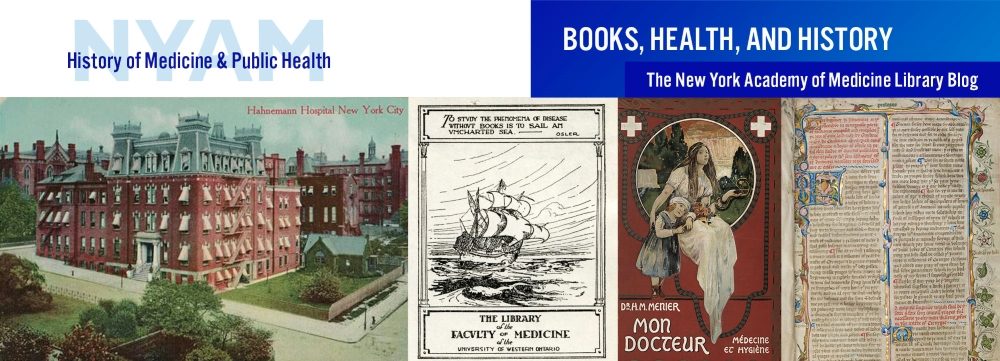By Logan Heiman, Digital Collections Manager
September 15 marks the beginning of National Hispanic Heritage Month, which celebrates the cultures, traditions, heritage, and achievements of those in the United States who trace their roots to Spain and the Spanish-speaking countries of Latin America. At the New York Academy of Medicine, we are celebrating the accomplishments and contributions of Hispanic Americans to medicine and public health in the United States. According to survey data compiled by the National Center for Health Workforce Analysis in 2018, more than 10% of registered nurses in the United States identified as Hispanic, Latino, or Spanish. Contrast this with Ildaura Murillo-Rohde’s remarks about the paucity of representation in Washington, DC, for Hispanic nurses early in her career: “I saw that I was the only Hispanic nurse who was going to Washington to work with the federal government, review research and education grants, etc. There was nobody else. I looked behind me and thought: ‘Where are my people?’”

Ildaura Murillo-Rohde (1920–2010) was a Panamanian American nurse, academic, and health policy advocate who championed of the unique health care needs of Hispanic populations. Murillo-Rohde earned a nursing diploma from the Medical and Surgical Hospital School of Nursing in San Antonio, Texas, before obtaining an undergraduate degree in the teaching and supervision of psychiatric nursing from Teachers College, Columbia University, in 1953. Upon graduation, she joined Bellevue Psychiatric Hospital, working with patients diagnosed with “Puerto Rican syndrome,” the name for a condition first used to describe traumatized Puerto Rican soldiers in the Korean War. Wayne County General Hospital’s Psychiatric Division in Michigan then recruited her before she returned to New York to open Elmhurst General Hospital’s first psychiatric division in Queens. In 1971 she became the first Hispanic nurse to earn a PhD from New York University.
Throughout her career Murillo-Rohde maintained a strong commitment to growing the ranks of Hispanic nurses. Informed by her experience as a reviewer of federal research and education grants, she also sought to boost the number of policy experts advising lawmakers on the health care concerns of Hispanic communities. In the 1970s, Murillo-Rohde was an active member of the American Nurses Association (ANA), where she mounted a two-year-long effort to include the Ad Hoc Committee of the Spanish-Speaking/Spanish Surname Nurses’ Caucus in the ANA’s administrative structure. In 1975, with a group of about 15 nurses, Murillo-Rohde formed the National Association of Hispanic Nurses (NAHN) after the ANA rejected attempts to formally recognize the caucus.

Since its inception, NAHN has worked broadly to improve health care delivery and outcomes for the Hispanic community in the United States. Today, the organization sponsors an award for distinction in nursing scholarship, research, and practice, as well as a scholarship for Hispanic students enrolled in nursing programs that lead to licensure.
NAHN also publishes Hispanic Health Care International, featuring research and scholarship on issues of import to US and international Hispanic populations. Judith Aponte, a 2012 NYAM Fellow and Associate Professor of Nursing at Hunter College, is a former editor-in-chief of HHCI.
Beyond her role as founder and first president of NAHN, Murillo-Rohde was an expert on psychotherapy, marriage, and family therapy, and served in several roles in academic administration, including Dean of the College of Nursing at SUNY Downstate Medical Center. Murillo-Rohde’s influence was felt internationally as well through her appointment as WHO’s psychiatric consultant to the Guatemalan government, establishing a pilot program to train personnel in psychiatric care. She further served as Permanent UN Representative to UNICEF for the International Federation of Business and Professional Women. Murillo-Rohde passed away in her native Panama in 2010 at the age of 89.
References
1. Aponte, Judith. School of Nursing at Hunter College, City University of New York, 2021. http://www.hunter.cuny.edu/nursing/faculty/judith-aponte
2. Brush, Barbara & Villarruel, Antonia (2014). “Heeding the Past, Leading the Future.” Hispanic Health Care International. 12. DOI: 10.1891/1540-4153.12.4.159.
3. Feldman Harriet, PhD, RN, FAAN, et al. Nursing Leadership: A Concise Encyclopedia. 2nd ed., Springer Publishing Company, 2011, p. 393.
4. Ildaura Murillo-Rohde Papers, Barbara Bates Center for The Study of The History of Nursing, School of Nursing, University of Pennsylvania.
5. Portillo, Carmen. “25 and Counting.” Minority Nurse Magazine. 30 Mar. 2013. https://minoritynurse.com/25-and-counting/
6. U.S. Department of Health and Human Services, Health Resources and Services Administration, National Center for Health Workforce Analysis. 2019. Brief Summary Results from the 2018 National Sample Survey of Registered Nurses, Rockville, Maryland. https://data.hrsa.gov/DataDownload/NSSRN/GeneralPUF18/nssrn-summary-report.pdf

Pingback: Google Doodle Honors Panamanian Dr. Ildaura Murillo-Rohde, Who Founded the National Association of Hispanic Nurses – Repeating Islands
Pingback: Google Doodle Honors Panamanian Dr. Ildaura Murillo-Rohde, Who Founded the National Association of Hispanic Nurses | Velvet classic
Pingback: Dr. Ildaura Murillo-Rohde - How did she became Pioneer for Hispanic Nurses?
Pingback:  - Universel Blog